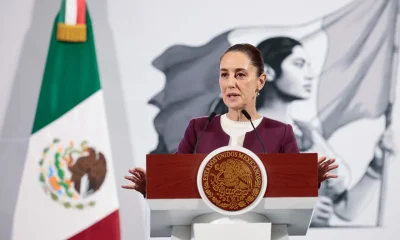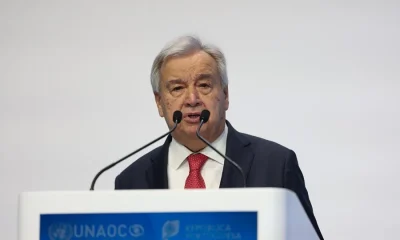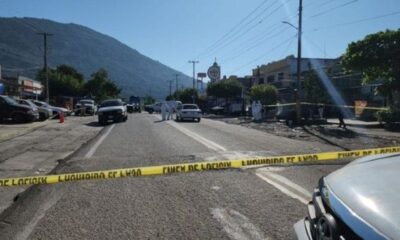International
The Congress of Peru approves a law that limits crimes against humanity, in defiance of the Court of Justice

The Permanent Commission of the Congress of Peru approved on Thursday, in a second vote, the law that proposes to limit the application and scope of crimes against humanity and war crimes, in open challenge to the Inter-American Court of Human Rights (CorteIDH), which asked the Peruvian State to annul it for the prescription it meant for those cases.
The rule was approved with 15 votes in favor, 12 against and no abstentions in a session of the Permanent Commission, which put it as one of the first topics of debate.
The Court of Justice had requested on Tuesday “the State of Peru, through its three Powers, to take the necessary actions so that they are not adopted, revoked or not given effect to Bill No. 6951/2023-CR that provides for the statute of limitations for crimes against humanity perpetrated in Peru.”
He also ordered Peru to submit a complete and detailed report on the fulfillment of his mandate no later than August 9.
The initial proposal was approved on June 7 by the plenary of Congress with 60 votes in favor, but it required this second vote for ratification and, precisely, this court ordered Peru on June 13 to stop its procedure until it issued a resolution on the subject.
The project was proposed by the Fujimori party Fuerza Popular and the ultra-conservative Renovación Popular, a bench made up in part of former heads of the Armed Forces, and aims to prevent anyone from being prosecuted for crimes against humanity or war crimes that occurred before 2002 and, therefore, excludes the period of internal conflict (1980-2000) that left more than 69,000 victims in the country.
The Prime Minister of Peru, Gustavo Adrianzén, said on Wednesday that he is “indignant” by the order of the Court of Justice on the bill, until today.
“Indignant, absolutely indignant, by what was resolved by the Inter-American Court of Human Rights that decides in the most unusual way, and without any precedent, on a bill that has not even become a law,” Adrianzén said when consulted on the subject.
The prime minister added that “it is intolerable” for the supranational court to call on the three powers (Executive, Legislative and Judicial) “of a sovereign member state,” such as Peru, not to approve or apply a law.
He pointed out that he is promoting a joint pronouncement of the three powers to express “the rejection of this type of provision from supranational justice.”
Human Rights organizations affirm that this initiative will affect access to justice and truth for victims of human rights violations, specifically in the cases of La Cantuta and Barrios Altos, for which former President Alberto Fujimori (1990-2000) was sentenced in 2009 to 25 years in prison.
International
Trump criticizes Panama Canal fees and demands U.S. control over strategic waterway

U.S. President-elect Donald Trump criticized what he described as unfair fees imposed on American ships passing through the Panama Canal and threatened to demand that Washington take back control of the strategic waterway.
“Our Navy and commerce have been threatened in a very unjust and reckless way. The rates that Panama charges are ridiculous,” Trump wrote on his Truth Social platform.
The president-elect also denounced the growing influence of China in the canal, a situation he called concerning as U.S. businesses depend on the waterway to transport goods between the Atlantic and Pacific Oceans.
“This complete scam against our country will end immediately,” he stated.
The Panama Canal, completed by the United States in 1914, was handed over to Panama under the 1977 treaty signed by Democratic President Jimmy Carter. Panama took full control of the commercial passage in 1999.
“It was exclusively for Panama to manage, not China or anyone else,” Trump said. “We would never allow it to fall into the wrong hands!”
“If Panama cannot guarantee a ‘safe, efficient, and reliable’ operation of the canal, we will demand that the Panama Canal be returned to us in its entirety, without a doubt,” the Republican added.
Panamanian authorities did not immediately respond to Trump’s statements. While he will assume office on January 20, Trump has been exerting his political influence in the final days of President Joe Biden’s administration.
Five percent of global maritime trade passes through the Panama Canal, which allows vessels traveling from Asia to the U.S. East Coast to avoid the long and dangerous route around the southern tip of South America.
The countries that use the Panama Canal the most are the United States, China, Japan, and South Korea.
In October, the Panama Canal Authority reported earnings of nearly $5 billion in the last fiscal year.
International
Putin vows retaliation following drone attack on luxury building in Kazan

Russian President Vladimir Putin promised more “destruction” in Ukraine on Sunday, in response to a drone strike that hit a residential building in the city of Kazan, located in central Russia, on Saturday.
Russia accused Ukraine of launching a “massive” drone attack, which struck a luxury apartment block in Kazan, about 1,000 kilometers from the border.
Videos shared on Russian social media show drones hitting a high-rise glass building. No casualties have been reported as a result of the attack.
In his statements, Putin addressed the local leader of Tatarstan, the region where Kazan is located, during a virtual ceremony marking the opening of a road.
The attack in Kazan is the latest in a series of increasingly frequent bombings in this nearly three-year-old conflict. Ukraine has not commented on the attack.
Putin had previously threatened to strike the center of Kyiv with a hypersonic ballistic missile in response to Ukrainian attacks on Russian territory.
The Russian Ministry of Defense stated that the recent Russian strikes on Ukrainian energy facilities were retaliation for Ukraine’s use of Western-supplied missiles to target Russian territory.
International
Small plane crashes in Gramado, Brazil, killing nine people

At least nine people were killed on Sunday after a small aircraft crashed in a commercial area of the tourist city of Gramado, in the southern Brazilian state of Rio Grande do Sul, authorities confirmed.
“There are nine confirmed deaths according to Civil Defense services, and there are no survivors from the plane,” said Cléber dos Santos Lima, director of the Interior Police Department of the Civil Police of the state, in a statement to AFP.
Authorities have not yet confirmed the exact number of passengers and crew aboard the aircraft, a turbo-prop Piper Cheyenne 400. However, Civil Defense had previously stated that “preliminarily, the plane was carrying ten people.”
The plane crashed on Sunday morning “into the chimney of a building, then onto the second floor of a house, and finally fell onto a furniture store,” according to a statement from the Rio Grande do Sul Public Security Secretariat.
-

 Central America4 days ago
Central America4 days agoAmnesty International condemns Nicaragua’s unprecedented repression of dissent
-

 Sports4 days ago
Sports4 days agoReal Madrid clinches fourth Intercontinental Cup with 3-0 victory over Pachuca
-

 Central America4 days ago
Central America4 days agoEl Salvador’s MARN monitors ongoing seismic activity in La Unión department
-

 International4 days ago
International4 days agoMexico requests extradition of ‘Mini Lic’ for murder of journalist Javier Valdez
-

 International3 days ago
International3 days agoThe Court of the IADH rules out measures in favor of Gustavo Petro amid investigations into his campaign
-

 International4 days ago
International4 days agoMexican government to use church atriums for gun surrender program to combat violence
-

 International3 days ago
International3 days agoTrump links Mike Johnson’s re-election to meeting his budget requirements
-

 International4 days ago
International4 days agoCuba’s government stresses openness to serious, respectful U.S. relations
-

 International3 days ago
International3 days agoThe Constitutional Court of Peru annuls the sentence against the leader of Dina Boluarte’s former party
-

 International4 days ago
International4 days agoBegoña Gómez defends her actions as investigations into her role at Complutense University continue
-

 International3 days ago
International3 days agoGuterres calls for “avoiding at all costs” the integration of AI into nuclear weapons
-

 International4 days ago
International4 days agoNASA delays return of two astronauts stranded on ISS until at least March
-

 International5 days ago
International5 days agoAustrian man arrested in Croatia with deceased woman as passenger in his car
-

 International5 days ago
International5 days agoHomemade landmine explosion in Michoacán kills two soldiers, injures five
-

 International5 days ago
International5 days agoColombian nationals arrested for human trafficking and disappearance of migrant boat
-

 International1 day ago
International1 day agoAt least ten dead in Iran in a bus accident in the west of the country
-

 International1 day ago
International1 day agoHelene, the violent hurricane that destroyed the southeastern United States
-

 International4 days ago
International4 days agoUkraine’s security a priority as NATO discusses future of conflict with Russia
-

 International1 day ago
International1 day agoAt least 21 dead and 61 injured after Israel’s last attacks in Gaza
-

 International4 days ago
International4 days agoPatient hospitalized with severe avian flu case in Louisiana, CDC reports
-

 International3 days ago
International3 days agoAn appeals court disqualifies the prosecutor in the election case against Trump in Georgia
-

 International1 day ago
International1 day agoMilei closed about 200 areas of the Public Administration in its first year of Government
-

 International1 day ago
International1 day agoThe piangua, the mangrove mollusk that empowers women in the Colombian Pacific
-

 International3 days ago
International3 days agoThe new French prime minister launches an ultimatum to the moderate parties and the left rejects his offer
-

 International1 day ago
International1 day agoNew Syrian leader addresses with the United States the lifting of sanctions for reconstruction
-

 International5 days ago
International5 days agoEcuador announces debt swap of $1.527 billion to protect Amazon rainforest
-

 Internacionales3 hours ago
Internacionales3 hours agoSinaloa security secretary resigns amid wave of violence and cartel infighting
-

 International3 hours ago
International3 hours agoSmall plane crashes in Gramado, Brazil, killing nine people
-

 International3 hours ago
International3 hours agoPutin vows retaliation following drone attack on luxury building in Kazan
-

 International3 hours ago
International3 hours agoTrump criticizes Panama Canal fees and demands U.S. control over strategic waterway




















